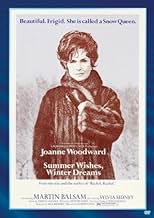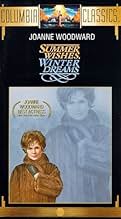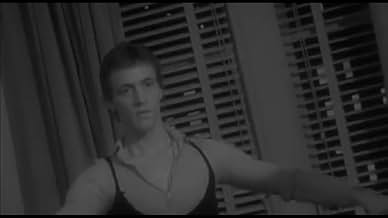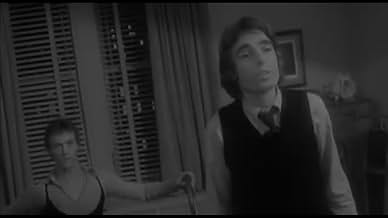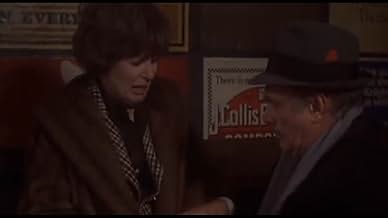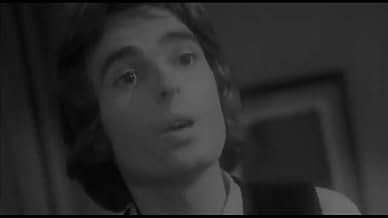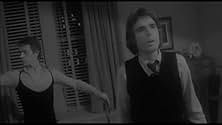Rita, a middle aged New York City homemaker, finds herself in an emotional crisis which forces her to re-examine her life, as well as her relationships with her mother, her eye doctor husban... Read allRita, a middle aged New York City homemaker, finds herself in an emotional crisis which forces her to re-examine her life, as well as her relationships with her mother, her eye doctor husband, her alienated daughter and estranged son.Rita, a middle aged New York City homemaker, finds herself in an emotional crisis which forces her to re-examine her life, as well as her relationships with her mother, her eye doctor husband, her alienated daughter and estranged son.
- Nominated for 2 Oscars
- 5 wins & 8 nominations total
Nancy Andrews
- Mrs. Hungerford
- (voice)
Charlotte Oberley
- Waitress
- (as Charlet Oberley)
- Director
- Writer
- All cast & crew
- Production, box office & more at IMDbPro
Featured reviews
In wintry New York City, attractive middle-aged Joanne Woodward (as Rita) awakens from nightmare. After battling insomnia, Ms. Woodward arranges to meet nicotine-stained mother Sylvia Sidney for lunch. The bickering mother and daughter suggest complaining may be an inherited trait. Woodward fears she's going blind, but husband Martin Balsam (as Harry Walden), conveniently an eye doctor, discovers his wife needs reading glasses. Keeping herself busy, Woodward babysits a crying grandson and sees a revival of Ingmar Bergman's "Wild Strawberries" with Ms. Sidney. During black-and-white movies, Woodward dreams in black-and-white. An unhappy event forces Woodward to reexamine her life. To help, Mr. Balsam takes his wife on a European trip...
"Summer Wishes, Winter Dreams" is a dreary story about an unlikable woman. Masterpieces may fit that description, but this isn't one of them...
The characters and story are rich, but undeveloped. The camera follows when it should lead and a few edits appear to favor scenery at the expense of characters. Most pointedly, Woodward's whimpering epiphany is inadequate. She never gets to let her hair down. Still, it's a good film. The acting is universally excellent. Woodward and Sidney won major acting awards. Balsam is just as good. Writer Stewart Stern does best with a secondary story involving Balsam's character, a World War II veteran. Self-identified "fat" daughter Dori Brenner (as Anna) and her aunt Tresa Hughes (as Betty) are brief, but memorable. Director Gilbert Cates artfully introduces Woodward's estranged son Ron Richards (as Bobby) in the opening nightmare, then, he is regulated to dreams.
****** Summer Wishes, Winter Dreams (10/21/1973) Gilbert Cates ~ Joanne Woodward, Martin Balsam, Sylvia Sidney, Dori Brenner
"Summer Wishes, Winter Dreams" is a dreary story about an unlikable woman. Masterpieces may fit that description, but this isn't one of them...
The characters and story are rich, but undeveloped. The camera follows when it should lead and a few edits appear to favor scenery at the expense of characters. Most pointedly, Woodward's whimpering epiphany is inadequate. She never gets to let her hair down. Still, it's a good film. The acting is universally excellent. Woodward and Sidney won major acting awards. Balsam is just as good. Writer Stewart Stern does best with a secondary story involving Balsam's character, a World War II veteran. Self-identified "fat" daughter Dori Brenner (as Anna) and her aunt Tresa Hughes (as Betty) are brief, but memorable. Director Gilbert Cates artfully introduces Woodward's estranged son Ron Richards (as Bobby) in the opening nightmare, then, he is regulated to dreams.
****** Summer Wishes, Winter Dreams (10/21/1973) Gilbert Cates ~ Joanne Woodward, Martin Balsam, Sylvia Sidney, Dori Brenner
Uptight, possibly frigid, panic-stricken middle-aged New York housewife has to learn to let go of the past, a refuge which doesn't necessarily bring her happiness but does provide her life with some kind of stability. Joanne Woodward gives a good performance here; not at all vain, and unafraid to let herself be pinchy, selfish, or even annoyingly helpless, Woodward overcomes this rather dreary "woman's picture" material with thoughtful touches and nuances. It's a heavy load however, and she doesn't have much help until the final reel when her needling, provoking matron takes a European trip with her husband (Martin Balsam, also doing fine work) and she comes to see her humanity as something she can work with as opposed to frittering it away. Screenwriter Stewart Stern's dialogue is heavy with a writer's pretensions, and often the chit-chat is pedantic, forced and unreal. Near the beginning, Woodward gets a phone call from her mother and asks, "Who is this?" A few scenes later, Woodward becomes exasperated with her husband and asks, "How many years have we been married?" These moldy exchanges are lazy outs for a writer wanting to introduce us to the characters; instead of letting us discover these people and their hang-ups for ourselves, everything is spelled out (and poorly so). We are to understand that Joanne's estranged son is gay after she has a dream in which a male dancer is caught in the boy's bedroom--in ballet tights! The 'colorless' color cinematography is a mix of putrid browns and greens, and director Gilbert Cates begins each new sequence with a big wind-up, as if the movie were starting all over again. The rhythm is off, and with lines like "You approach every new relationship like you would a toll-booth, Mrs. Santa Claus!", one doesn't know how to respond to the characters. It's possible that some of Woodward's jaunts to her past, both real and imaginary, will strike some viewers as very personal, but the film isn't especially moving, at least not until the final third. **1/2 from ****
This is a great movie showing Joanne Woodward and her husband in the film, Martin Balsam, dealing with their feelings and memories of the past and the events that have shaped them. I found this movie moving. Joanne Woodward's memories of she and her mother are memorable! I wish I had seen this movie when my mother was still living. Balsam's memories of his war experiences are insightful and moving. We are all shaped by our experiences!
Rita, the "snow queen" is another of Joanne Woodward's aging spinster virgin frumps, that she seemed to specialise in the early 1970's. Depressed and discontent, her mental state is symbolised by the nightmare plane crash that director Gilbert Cates opens the film with. Writer Stewart Stern - who also wrote Rachel, Rachel - loads on the psycho-baggage. She has a demanding mother (Sylvia Sydney), a fat daughter (Doris Brenner), a gay son, and has married a man she did not love (Martin Balsam). All this would be unbearable with anyone but Woodward playing the role since she lightens it with her natural intelligence and sly sense of humour. It's amusing to see Balsam and Woodward argue in their middle-class educated way, though Rita's wearing a mink clues you that she isn't about to scream abuse. Balsam's subtlety, in particular makes you regret his few screen appearances. The only character that isn't redeemed by the acting is that of the gay son, since he is a cypher, and Cates presents his coming out in a homophobic black-and-white expressionistic sequence. Cates is fond of these kind of theatrical flourishes. There is a death at a screening of Wild Strawberries, a spirited chase at a former European battlefield, a family bickering at a graveyard, and Rita has a breakdown in a crowded London subway, which is probably the most believable of them all. Johnny Mandel provides a lovely theme, in his understated way, and then embarasses himself with trumpets in the battlefield sequence.
With a great performance by Joanne Woodward as a middle aged New York woman named Rita Walden going through an emotional crisis, this movie is a true original. Directed by Gilbert Cates, it shows one woman's strained family relationships as the movie goes from one scene to another where she interacts with the other characters in a series of interesting vignettes.
Rita's mother is played by Sylvia Sidney, whose career dated back to 1929 and her husband Harry, an ophthalmologist, is Martin Balsam, one of the most versatile and recognizable of actors. We see imaginary encounters that go through her mind. The opening scene is a jaw dropper. Another of theses occurs in the New York subway station as she imagines her mother and grandparents looking at her from an escalator. I didn't find these flashbacks particularly relevant to the story and they seemed jarring in an otherwise irresistible movie.
We find Rita shopping in the streets of downtown New York near Washington Square with her energetic, 73 year old mother and then stopping off at a theatre to watch a Bergman movie. The scene shifts to a cemetery covered with brown leaves in the autumn mist as the family bickers over the estate before the deceased is even in the ground. Then on a trip to France with her husband she wanders through a muddy French village where her husband fought in the war. It is here that her husband shares stories that have haunted him for 30 years.
Silvia Sydney is superb in the first part of the movie as a mother with a youthful zest for life, a sharp contrast to her daughter. Martin Balsam is the steadying force in her life but relives his own dark shadows on returning to a former theatre of war in France. Of course, it is Joanne Woodward's role that is critical to the story and she is excellent.
Rita's mother is played by Sylvia Sidney, whose career dated back to 1929 and her husband Harry, an ophthalmologist, is Martin Balsam, one of the most versatile and recognizable of actors. We see imaginary encounters that go through her mind. The opening scene is a jaw dropper. Another of theses occurs in the New York subway station as she imagines her mother and grandparents looking at her from an escalator. I didn't find these flashbacks particularly relevant to the story and they seemed jarring in an otherwise irresistible movie.
We find Rita shopping in the streets of downtown New York near Washington Square with her energetic, 73 year old mother and then stopping off at a theatre to watch a Bergman movie. The scene shifts to a cemetery covered with brown leaves in the autumn mist as the family bickers over the estate before the deceased is even in the ground. Then on a trip to France with her husband she wanders through a muddy French village where her husband fought in the war. It is here that her husband shares stories that have haunted him for 30 years.
Silvia Sydney is superb in the first part of the movie as a mother with a youthful zest for life, a sharp contrast to her daughter. Martin Balsam is the steadying force in her life but relives his own dark shadows on returning to a former theatre of war in France. Of course, it is Joanne Woodward's role that is critical to the story and she is excellent.
Did you know
- TriviaFeatures Sylvia Sidney's only Oscar-nominated performance.
- GoofsWhen the gurney is wheeled out of the ER, the sheet over the body is relatively flat. When Rita is next to the gurney, the sheet is elevated due to the body's arms being across the body.
- Quotes
Mrs. Pritchard - Rita's Mother: I thought I was having a heart attack.
- ConnectionsFeatured in Oscars, Actors and The Exorcist (1974)
- SoundtracksWhere is your Heart
(Moulin Rouge)
Music by Georges Auric
French lyrics by Jacques Larue
English lyrics by William Engvick
- How long is Summer Wishes, Winter Dreams?Powered by Alexa
Details
Contribute to this page
Suggest an edit or add missing content

